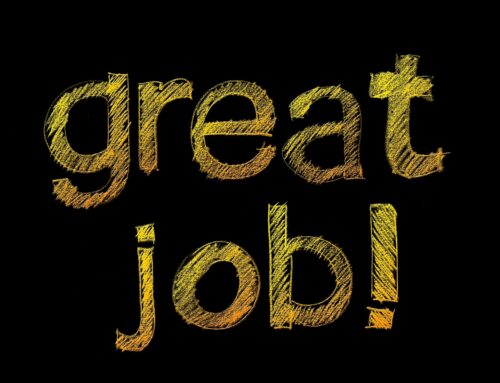When we think about what we want to accomplish in the coming year, we generally focus on how we want to change ourselves, what we didn’t like about our behavior last year and maybe even what we did wrong. While I am always in favor of a conscious effort to improve, I am going to suggest that it is extremely worthwhile to devote some time to identifying what worked really well last year, where you excelled and what you’re doing that you would like to see more of.
The idea of a focused effort to do more of the same, instead of changing your behaviors and instituting a bunch of new ones, is the reverse of the usual approach and makes me think of bizarro Superman from “Seinfeld”—”Superman’s exact opposite who lives in the backwards bizarro world. Up is down, down is up. He says hello when he leaves, goodbye when he arrives.” Let’s take a look at why we are so focused on the negative when we review our past.
I started thinking about this when I saw a negative comment posted on LinkedIn responding to an article I wrote. Since I began writing for this paper, the feedback has been, without exception, positive. Many “likes” were logged and some readers even took the time to write appreciative comments. Yet this one negative comment really bothered me and I spent more time thinking about it than all of the positives. Why?
An article in the Review of General Psychology titled “Bad Is Stronger Than Good” explains that our brains are hardwired to place greater emphasis on negative experiences. “Bad emotions, bad parents and bad feedback have more impact than good ones, and bad information is processed more thoroughly than good,” the article says. “The self is more motivated to avoid bad self-definitions than to pursue good ones. Bad impressions and bad stereotypes are quicker to form and more resistant to disconfirmation than good ones.”
There is no single, simple explanation, but various hypotheses. It could have to do with basic survival instincts: “From our perspective, it is evolutionarily adaptive for bad to be stronger than good. We believe that throughout our evolutionary history, organisms that were better attuned to bad things would have been more likely to survive threats and, consequently, would have increased probability of passing along their genes.”
Language also plays a powerful role, according to the article: “To the extent that negative emotions are more powerful and important, they should be more fully represented in the language. Sure enough, there appear to be more words for negative than positive emotions.”
Mental processing factors in as people search to find meaning from their experiences. “To find meaning, people can try to find a cause that provides them with an answer to the question as to why certain events happened or they can try to find a different interpretation and reframe their experiences. Some evidence suggests that negative events cause people to engage in greater search for meaning and making sense than positive events,” the article says.
Anecdotally, I have spoken with many people who seek to understand why a negative event occurred in their lives and none who wonder why something good came their way.
Getting back to our aspirations: My modest proposal is that you take a break from beating yourself up and find some inspiration for the future in what you have done really well and plan some goals around that to cement and improve what is already a strength. We will use the model of appreciative inquiry, developed by David Cooperrider and his colleagues at the Weatherhead School of Management at Case Western Reserve University.
Appreciative inquiry is a way of looking at past successes and leveraging them to transform the present and create an improved future. Rather than identifying problems and evaluating causes, appreciative inquiry seeks to find the best of what is and envision what might be. Regardless of whether you are planning for a better year individually or as part of a partnership or team, appreciative inquiry reframes the language that you use to find a way to better outcomes. Focusing on what you have done well creates confidence and your belief about an experience and how you talk about it shapes the future.
Perhaps most importantly, appreciative inquiry assumes that whatever is going on, something is working.
So, let go of modesty for a moment and choose a past success, a high point in your professional life where you felt alive, engaged and effective. Perhaps you contributed to a successful outcome, negotiated a favorable deal, reeled in a great new client, or wrote a policy, white paper, brief or article that was particularly excellent. About this peak experience, ask yourself these questions and write down the answers:
- What happened?
- Who was there?
- What insights do you have about your current and future prospects when you think about yourself in that moment?
- What happened when you achieved this success?
- What challenges did you overcome and what impact did this have on you and your life?
- What were some of the conditions present that supported these results to occur?
- What strengths did you use related to that experience?
- Are there other experiences where you used the same strengths?
- How does this experience demonstrate what you value most about yourself as a person, friend, parent, associate, husband, wife, sibling, child, etc.?
- When you think about the experience, what is it that you value?
- What else is working in your professional life right now?/
- What are two or three wishes for your professional or personal life?
- What are two or three strengths you have that you could apply to make those wishes a reality?
It is now 2016 and your wishes for your life have come true. What has happened and what makes you most proud? Take some time to envision this. Describe it in writing. Find one thing you can do right now to move in the direction you want. Write it down. Give yourself a deadline. Find a way to be accountable. When you have completed that step, return to your description and design another action.
When you start looking at what is working, you will find more and more. I have seen clients rediscover talents they forgot about, gifts they took for granted and benefits in their daily lives that had receded from consciousness. One client, who was starting her own business, actually forgot that she had helped new businesses in a prior job. It was only when asked about what in her past might assist in the current endeavor that she remembered she had done for others what she now wanted to do for herself. It was a breakthrough moment.
The best part of approaching things this way is that you are building off of what you already have and what is already working and just doing more of what you already know. It may seem like bizarro world, but it is the opposite.
Reprinted with permission from the January 29, 2015 edition of “The Legal Intelligencer” © 2015 ALM Media Properties, LLC. All rights reserved. Further duplication without permission is prohibited. For information, contact 877-257-3382, reprints@alm.com or visit www.almreprints.com.





